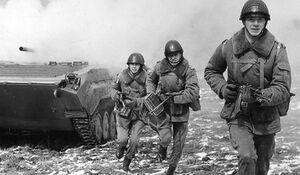Denebola War
| Denebola War | |||||||
|---|---|---|---|---|---|---|---|
 Jedorian infantry during the war | |||||||
| |||||||
| Belligerents | |||||||
|
| Kolodiya | ||||||
| Commanders and leaders | |||||||
|
| |||||||
| Strength | |||||||
| 225,000 troops | 250,000 troops | ||||||
| Casualties and losses | |||||||
|
8,000 killed 17,000 wounded |
10,000 killed 25,000 wounded | ||||||
The Denebola War was an armed conflict between the Socialist Republic of Jedoria and Kolodiya. It began on 11 May 1973 and was ended after mediation by Letnia on 2 November later that year.
Starting in the early 70s, Jedoria had begun accusing Kolodiyan law enforcement of persecution of ethnic Jedorians living in the Denebola territories, which were split between Jedoria and Kolodiya. Kolodiyan authorities denied the accusations, which remained persistent despite attempts at negotiations. Relations between the two states began to decline as Jedorian General Secretary Aleksis Kraulis accused Kolodiya of anti-Jedorian sentiment. Matters were made worse by the unclear borders between the two states which resulted in several border clashes in remote regions, prompting both sides to mobilize and subsequently deploy military forces to the Denebola region. After a series of skirmishes, Kraulis ordered the Jedorian People's Army to enforce Jedoria's territorial claims, leading to the outbreak of open hostilities on 11 May 1973.
Jedorian forces originally struggled to make significant breakthroughs in large part due to the remoteness of the region and the distance involved, but during the summer several offensive operations succeeded in pushing Kolodiyan forces out of Denebola, which was largely under Jedorian control by August. Neither side was prepared to end the conflict, and fighting continued on until a Letnian backed ceasefire and peace treaty was signed, bringing the war to an end on 2 November. Although Jedoria had gained what it wanted, Kraulis saw Letnian support for Kolodiya as a sign of dishonesty on their part. The Letnian Empire inversely saw Jedorian willingness to use military force to assert territorial claims as dangerously destabilizing, leading to a souring of relations between Jedoria and Letnia. Jedorian gains in the war, and later in the Vyzhvan-Jedorian War, are widely believed to have confirmed Kraulis's belief that he could expand Jedorian borders through military might, leading to his eventual confrontation with Letnia in the Cherniyan War.